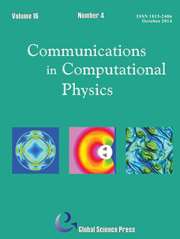Article contents
Weighted Interior Penalty Method with Semi-Implicit Integration Factor Method for Non-Equilibrium Radiation Diffusion Equation
Published online by Cambridge University Press: 03 June 2015
Abstract
Weighted interior penalty discontinuous Galerkin method is developed to solve the two-dimensional non-equilibrium radiation diffusion equation on unstructured mesh. There are three weights including the arithmetic, the harmonic, and the geometric weight in the weighted discontinuous Galerkin scheme. For the time discretization, we treat the nonlinear diffusion coefficients explicitly, and apply the semi-implicit integration factor method to the nonlinear ordinary differential equations arising from discontinuous Galerkin spatial discretization. The semi-implicit integration factor method can not only avoid severe timestep limits, but also takes advantage of the local property of DG methods by which small sized nonlinear algebraic systems are solved element by element with the exact Newton iteration method. Numerical results are presented to demonstrate the validity of discontinuous Galerkin method for high nonlinear and tightly coupled radiation diffusion equation.
Keywords
- Type
- Research Article
- Information
- Copyright
- Copyright © Global Science Press Limited 2013
References
- 3
- Cited by


